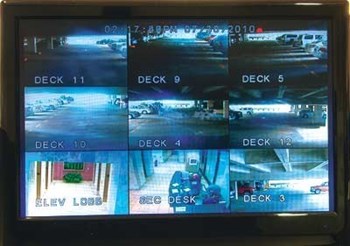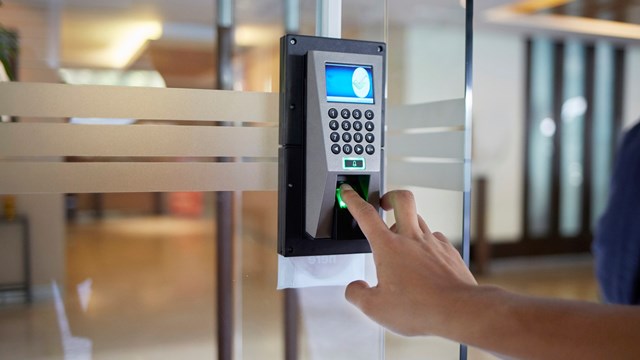
It takes more than a watch dog and a dead bolt lock to feel secure these days. In a multi-housing setting, countless opportunities exist for hopeful crooks to infiltrate and commit crimes. Often, properties are cased for days, weeks or months before the crime is committed. How safe are you?
According to Neighborhood Scout, last year in the United States there were 2,222,196 burglaries and 6,588,873 thefts. In Massachusetts, for example, there were 36,094 burglaries and 107,128 thefts. In the Bay State, the likelihood that a person will be a victim of a property crime is 1 in 41.
Determining the level of security can become difficult for boards and management companies because there are many configurations and variables to consider. “There are so many types and kinds of condos it’s impossible to generalize. High-end, luxury condos may have their own security guards. Larger condominiums may contract out for security services,” says Attorney Clive Martin in the Boston office of Robinson & Cole, LLP. “Smaller condominiums may put their faith in bright exterior lighting and secure exterior doors. Some two or three-unit condominiums may not do anything beyond the precautions individual unit owners take.”
Variables such as building size and tenant population is an important part of the equation but boards should connect with their local police departments to achieve a better understanding of not only the neighborhood their condominium is located in but surrounding neighborhoods as well.
“Boards need to evaluate the crime rates and what type of crimes they are,” says Marshall Marinance, owner and president of Marshall Alarm Systems in Yorktown Heights, New York. “The next thing boards have to determine is if the crimes are coming from the inside or the outside such as people who work on the premises. Most of the crimes that occur do so in community rooms, pools and parking lots,” adds Marinance, a 37-year veteran of the security industry and vice president on the Electronic Security Association Board of Directors.
Levels of Protection
As the economy rebounds, boards are looking for ways to cut expenses. As a result, existing operations such as security systems can be overlooked for a period of time, which can be detrimental to the greater safety of the building, residents, visitors and employees.
“The trustees must do what’s reasonable in the circumstances. For example, a condominium in an urban environment may require a higher level of security than a suburban community,” says Martin. “Obviously the trustees have to balance fiscal constraints, the expectations of their unit owners and what they deem to be reasonable safety precautions.”
On average, a reasonable security system should consist of remote-controlled and self-locking external doors, voice and/or video intercom and external lights. Additions, depending on location, might also include barred windows, security cameras and 24-hour security personnel.
A secured premises usually has three levels of defense. The first is a well-marked and secured perimeter which should include a standard six-foot fence and as few entry and exit points as possible. Depending on location, a staffed security gate for entry and exit and closed circuit television cameras (CCTV) is recommended. The second line should focus on common areas such as roadways, walkways, parking lots, playgrounds, swimming pools, tennis courts, laundry rooms, lobbies and elevators. The third line of defense is physical and electronic security measures and procedures such as locks, electronic entrance (key card) or voice-activated entrances.
“An up-to-date security system requires competent and trained individuals to run it. The trustees’ commitment to security must be consistent and ongoing,” says Martin. “It’s not just a matter of installing cameras and alarms, but of ensuring that when the alarm goes off or the camera shows something untoward, the staff on site react appropriately. If there is no staff to react to incidents, then the system must be linked to local law enforcement.”
Technology has advanced considerably in recent years, which can eliminate certain costs such as having guards on duty around the clock. For instance, state-of-the-art digital cameras have replaced antiquated VHS machines that required manual supervision and were often difficult to review. Today’s cameras, while more expensive, can be remotely monitored and exacting time stamps is effortless. However, the market is rife with security cameras and packages that include software and hardware which can make it difficult for boards to know what to purchase.
“Whatever you put into your security system is what you will get out of it, especially with video surveillance,” says Marinance. “You need to have good quality. There have been problems in the past where crimes have occurred and captured under a video surveillance system, but if the recorder or the camera doesn’t give you a clear, concise picture it is difficult for law enforcement to pursue the crime.”
Marinance recommends that a building with 10 units should have at least six cameras positioned from the roof to the basement and at common areas in-between. The pricetag for high-quality cameras runs approximately $900 per camera, which includes software and hardware costs. Among items required for an effective system is an infrared camera for night time use and daytime cameras with exceptional frame rates and accompanying hard drive sizes that can handle vast data. Additionally, security signage should be easy to see at all entry and exit points.
“The one thing you do not want to do under any circumstance is install dummy cameras,” says Marinance. “When people see a camera, they expect a certain level of security. People assume the camera is working and it provides a sense of security. If a crime does occur and the camera is not working, there is a tremendous liability on the landlord.”
Marinance says boards should keep their finger on the pulse of technology and what is coming around the corner. “There is up-and-coming technology designed specifically for apartments and mid-rise buildings … it’s called a virtual doorman, which eliminates the need to have a doorman there physically, and consists of a typical intercom system with a camera,” he continues. “When someone wants to gain access to the building, they press a button and their image is directed to central monitoring facility which determines whether that person is authorized to enter the building. This will be all over the market and installed in many buildings in the next two to three years.”
Legal Ramifications
Even with security precautions, if a crime occurs, there is a gray area when it comes to placing blame. “When considering what minimum level of security is needed, a condominium association should be aware that, as a general rule, associations are not responsible for the criminal acts committed by third parties on association property,” says premises liability attorney Kristie Leff of the Hamden, Connecticut-based Bender, Anderson & Barba, P.C. “The law recognizes that it is not the duty of the association to ensure the safety of all unit owners and guests. There are, however, exceptions to this general rule.”
Leff explains that an association can be held liable in civil court for damages for foreseeable criminal acts. “If conditions exists that would make the commission of a criminal act likely or if a pattern of similar acts has already occurred that the association knew or should have known about but failed to act, the association may be held liable.” For example, if the condominium is located in a high-crime area where assaults have occurred and there is inadequate lighting or unlocked doors in common areas, Leff says the association may be responsible for damages as a result of an assault that takes place in an unlit, unlocked stairwell.
An association may be held liable in civil court for damages for criminal acts if it failed to maintain the security systems already in place which resulted in harm. “If an association installs a security gate at the entrance of the condominium parking lot, but fails to keep the gate in good repair such that it no longer functions and is stuck in the open position, the association may be held liable if a crime is committed by someone who otherwise would not have been allowed to enter the complex but for the open gate,” says Leff.
Another example that could lead to an association being held liable is in the hiring of security personnel. For example, if an association fails to perform a criminal background check and the guard then commits burglaries while on the job, the association may be held liable.
“A board that doesn’t do what’s reasonable may find itself in legal trouble if an incident occurs that can be reasonably laid to the absence of that protection. A resident who is, for example, attacked by an intruder who follows her into the building may bring a civil lawsuit against the condominium,” says Martin. “In extreme cases, individual trustees might be accused of neglecting their fiduciary obligations to the unit owners by not installing or not maintaining security equipment where there is a demonstrated risk or need.”
Boards are often inundated and busy with a plethora of issues. To this end, having a security system in place that is both up-to-date and effortless to manage lessens potential liabilities. On average, basic precautions such as staying alert, locking doors, especially after dark, and altering police to suspicious behavior all deter crimes.
“Management must keep up a specified level of security without being alarmist,” says Martin. “Plan ahead for situations such as contractors on the premises such as how are they identified, how do they get in and out of the building without propping open doors and how ladders and scaffolding will be secured at the end of the day.” He continues, “Trustees do not have to choose the most extreme or expensive solutions to security issues, but they do have to respond to problems they are aware of and that they deem reasonable concerns.”
When management companies or boards are in doubt regarding existing security systems and resulting liability, Leff says they should contact experts in the field. “If an association has concerns about its duties regarding security measures it should contact its association attorney,” she continues. “Additionally, there are many private security experts who can be found online who can give the association recommendations as to security measures.” n
W. B. King is a freelance writer and a frequent contributor to New England Condominium.






Leave a Comment